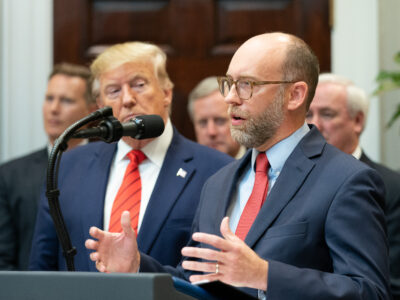General
We need integrated funding to scale up multibenefit projects
by Marie Grimm, Anna Serra-Llobet, Molly Bruce, and Michael Kiparsky
Climate and ecological challenges are fundamentally linked, demanding solutions that address both environmental and social issues. Multibenefit projects–like levee realignments that reconnect floodplains–can combine climate adaptation, water management and ecosystem restoration efforts. However, most funding programs focus on single-purpose projects, making it difficult to support multibenefit solutions. Our new article studies the Pajaro River flood …
Continue reading “We need integrated funding to scale up multibenefit projects”
CONTINUE READINGGovernors Lead the Fight on Forests and Climate
To see how governors are leading the fight against deforestation, look no further than a meeting happening this week in Brazil.
When the annual U.N. climate conference descends on the small Brazilian rainforest city of Belém in November 2025, it will be tempting to focus on the drama and disunity among major nations. Only 21 countries had even submitted their updated plans for managing climate change by the 2025 deadline required under the Paris Agreement. The U.S. is pulling out of …
Continue reading “Governors Lead the Fight on Forests and Climate”
CONTINUE READINGThe $133 Million Bat Tunnel
Here’s what permitting reform in the United Kingdom can teach the United States about building and abundance.
“We’ll rip out ‘insane’ environmental rules that block growth.” “We can’t get anything built anymore. Everything takes too long.” “We will streamline environmental obligations. We will limit the cynical legal challenges that block major infrastructure projects. We will strip away the years of consultation that drown builders.” You might well expect these threats and worries …
Continue reading “The $133 Million Bat Tunnel”
CONTINUE READINGWorthwhile Canadian Initiative! Really!
McGill University’s Sustainability Academic Network provides a useful — and potentially crucial — new platform.
About a week ago I got an email from McGill University’s Juan Serpa, asking me to join a new platform — the Sustainability Academic Network (SUSAN) — that contains literally thousands of datasets, academic papers, conferences, jobs, grants, local events, and institutes all devoted to sustainability. Great. Happy to do it (especially since they found …
Continue reading “Worthwhile Canadian Initiative! Really!”
CONTINUE READINGDOJ vs. C&T
What Trump’s new lawsuits against two states may mean for California’s cap-and-trade program.
As my UCLA Law colleague Ann Carlson described last week, Trump’s DOJ has filed two pretty extraordinary lawsuits against the states of Michigan and Hawaii trying to block those states — preemptively — from bringing suit against fossil fuel companies for climate harms. As Ann points out, these DOJ suits are among the first salvos …
Continue reading “DOJ vs. C&T”
CONTINUE READINGCoastal Act Requires Strict Protection from Harmful Seawalls
Students with UCLA’s Frank G. Wells Environmental Law Clinic are giving testimony before the California Coastal Commission on a critical issue.
As coastal communities up and down California contend with sea-level rise, they’re facing tough decisions about how to update their land use plans. One of UCLA Law’s environmental clinics is helping lead the way. Over the last several months students in the Frank G. Wells Environmental Law Clinic, Maeve Anderson, Mackay Peltzer, and Jacqueline Diaz …
Continue reading “Coastal Act Requires Strict Protection from Harmful Seawalls”
CONTINUE READINGDefunding the Energy Transition
The President Proposes Deep Cuts to Climate and Clean Energy Spending for FY 2026
On May 2nd, the White House released what is generally referred to as a “skinny” budget request outlining priorities for discretionary spending for fiscal year 2026. A full federal budget proposal is expected later this month. The “skinny” budget contains, by the White House’s calculations, $163 billion in non-defense discretionary spending cuts, which it argues …
Continue reading “Defunding the Energy Transition”
CONTINUE READINGThe Good, the Bad and the Utter Contempt
The Drain is a weekly roundup of climate and environmental news from Legal Planet.
The news this week has me remembering my grandpa teaching a young me to turn off the tap while brushing my teeth. (Hey, I was an ignorant East Coast kid.) This was in California’s Central Valley around 1990 when drought conditions flared and the federal government cut water deliveries. What was the news story? What …
Continue reading “The Good, the Bad and the Utter Contempt”
CONTINUE READINGCalifornia Lawmakers Vote on Energy Affordability Soon
Senate Bill 254 is the most ambitious energy affordability legislation proposed in recent years.
Energy affordability has been a huge focus in Sacramento as the deadline nears for bills to move out of policy committees. Over the past three years, customers of the largest investor-owned electric utilities (IOUs) in the state have seen their rates rise by an average of 5-41%, with nearly one in five households behind on …
Continue reading “California Lawmakers Vote on Energy Affordability Soon”
CONTINUE READINGModernizing Air Permitting in California
Guest Contributor Craig Segall writes that SB 318 would help clean up factories and other big industrial sources by pulling permitting practices into this century.
Almost every major industrial and power facility in California needs an air permit when it’s built or renovated. That’s a huge opportunity to rapidly advance the zero and near-zero technologies that Congress invested in in the Inflation Reduction Act, and that we urgently need to meet ever-more-pressing air quality challenges, especially as attacks from the …
Continue reading “Modernizing Air Permitting in California”
CONTINUE READING












